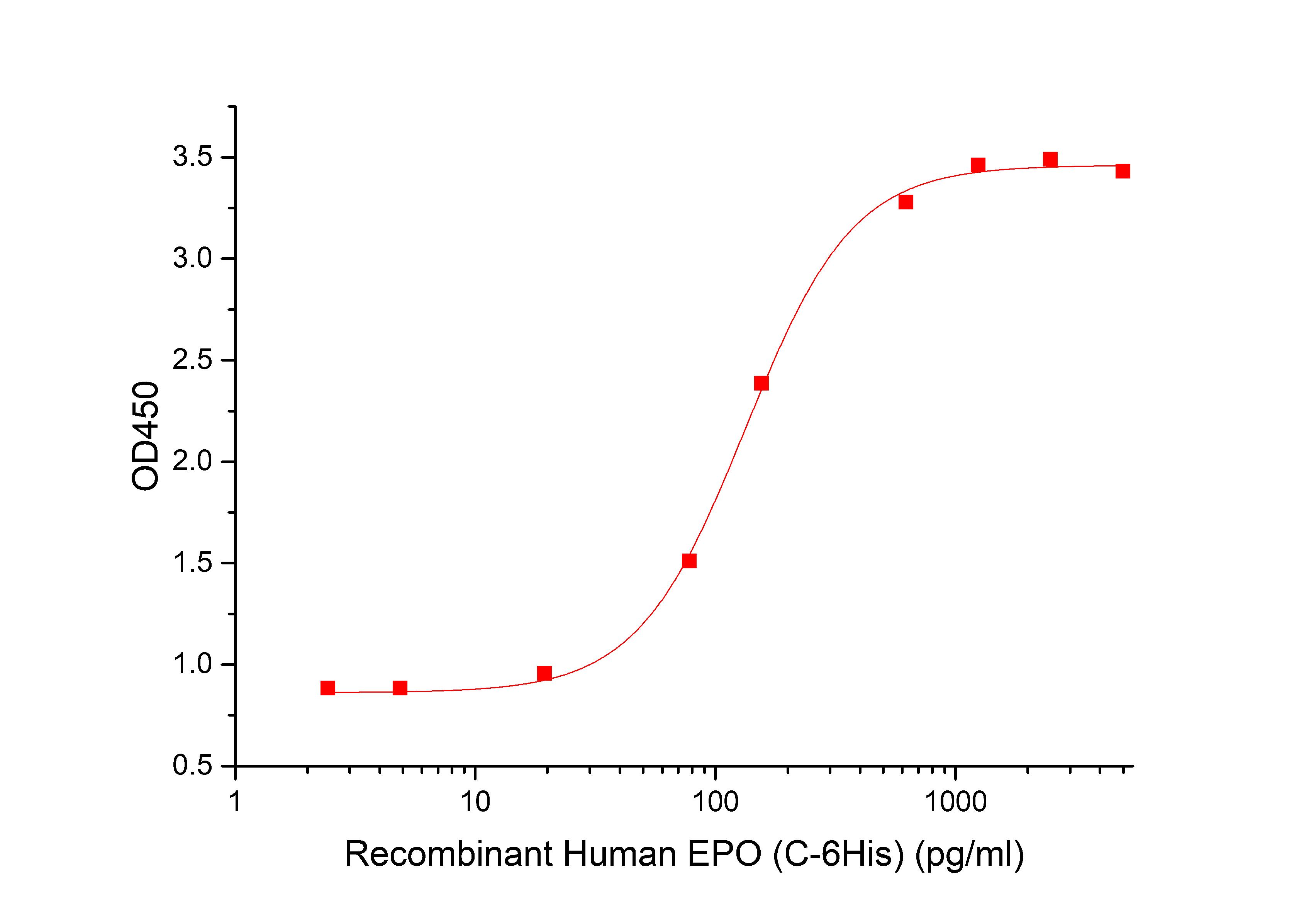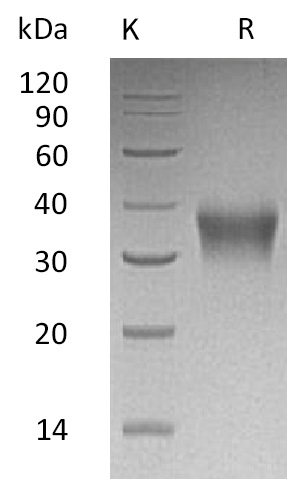 Your shopping cart is currently empty
Your shopping cart is currently empty
EPO/Erythropoietin Protein, Human, Recombinant (His)
Erythropoietin (EPO) is a glycoprotein hormone that is principally known for its role in erythropoiesis, where it is responsible for stimulating proliferation and differentiation of erythroid progenitor cells. Erythropoietin is a member of the EPO/TPO family. It is a secreted, glycosylated cytokine composed of four alpha helical bundles. The differentiation of CFU-E (Colony Forming Unit-Erythroid) cells into erythrocytes can only be accomplished in the presence of EPO. Physiological levels of EPO in adult mammals are maintained primarily by the kidneys, whereas levels in fetal or neonatal mammals are maintained by the liver. EPO also can exert various non-hematopoietic activities, including vascularization and proliferation of smooth muscle, neural protection during hypoxia, and stimulation of certain B cells. Genetic variation in erythropoietin is associated with susceptbility to microvascular complications of diabetes type 2. These are pathological conditions that develop in numerous tissues and organs as a consequence of diabetes mellitus. They include diabetic retinopathy, diabetic nephropathy leading to end-stage renal disease, and diabetic neuropathy.

EPO/Erythropoietin Protein, Human, Recombinant (His)
| Pack Size | Price | USA Warehouse | Global Warehouse | Quantity |
|---|---|---|---|---|
| 5 μg | $36 | - | In Stock | |
| 10 μg | $55 | In Stock | In Stock | |
| 20 μg | $87 | 7-10 days | 7-10 days | |
| 50 μg | $167 | 7-10 days | 7-10 days | |
| 100 μg | $293 | 7-10 days | 7-10 days | |
| 200 μg | $547 | 7-10 days | 7-10 days | |
| 500 μg | $1,220 | 7-10 days | 7-10 days |
Product Information
| Biological Activity | Measured in a cell proliferation assay using TF‑1 human erythroleukemic cells. The ED50 for this effect is 80-250 pg/ml. (QC verified)  |
| Description | Erythropoietin (EPO) is a glycoprotein hormone that is principally known for its role in erythropoiesis, where it is responsible for stimulating proliferation and differentiation of erythroid progenitor cells. Erythropoietin is a member of the EPO/TPO family. It is a secreted, glycosylated cytokine composed of four alpha helical bundles. The differentiation of CFU-E (Colony Forming Unit-Erythroid) cells into erythrocytes can only be accomplished in the presence of EPO. Physiological levels of EPO in adult mammals are maintained primarily by the kidneys, whereas levels in fetal or neonatal mammals are maintained by the liver. EPO also can exert various non-hematopoietic activities, including vascularization and proliferation of smooth muscle, neural protection during hypoxia, and stimulation of certain B cells. Genetic variation in erythropoietin is associated with susceptbility to microvascular complications of diabetes type 2. These are pathological conditions that develop in numerous tissues and organs as a consequence of diabetes mellitus. They include diabetic retinopathy, diabetic nephropathy leading to end-stage renal disease, and diabetic neuropathy. |
| Species | Human |
| Expression System | HEK293 Cells |
| Tag | C-6xHis |
| Accession Number | P01588 |
| Synonyms | Erythropoietin,Epoetin,EPO |
| Amino Acid | Ala28-Arg193 |
| Construction | Ala28-Arg193 |
| Protein Purity | Greater than 95% as determined by reducing SDS-PAGE. (QC verified)  |
| Molecular Weight | 30-40 kDa (reducing condition) |
| Endotoxin | < 0.1 ng/µg (1 EU/µg) as determined by LAL test. |
| Formulation | Lyophilized from a solution filtered through a 0.22 μm filter, containing PBS, pH 7.4. |
| Reconstitution | Reconstitute the lyophilized protein in distilled water. The product concentration should not be less than 100 μg/ml. Before opening, centrifuge the tube to collect powder at the bottom. After adding the reconstitution buffer, avoid vortexing or pipetting for mixing. |
| Stability & Storage | Lyophilized powders can be stably stored for over 12 months, while liquid products can be stored for 6-12 months at -80°C. For reconstituted protein solutions, the solution can be stored at -20°C to -80°C for at least 3 months. Please avoid multiple freeze-thaw cycles and store products in aliquots. |
| Shipping | In general, Lyophilized powders are shipping with blue ice. Solutions are shipping with dry ice. |
| Research Background | Erythropoietin (EPO) is a glycoprotein hormone that is principally known for its role in erythropoiesis, where it is responsible for stimulating proliferation and differentiation of erythroid progenitor cells. Erythropoietin is a member of the EPO/TPO family. It is a secreted, glycosylated cytokine composed of four alpha helical bundles. The differentiation of CFU-E (Colony Forming Unit-Erythroid) cells into erythrocytes can only be accomplished in the presence of EPO. Physiological levels of EPO in adult mammals are maintained primarily by the kidneys, whereas levels in fetal or neonatal mammals are maintained by the liver. EPO also can exert various non-hematopoietic activities, including vascularization and proliferation of smooth muscle, neural protection during hypoxia, and stimulation of certain B cells. Genetic variation in erythropoietin is associated with susceptbility to microvascular complications of diabetes type 2. These are pathological conditions that develop in numerous tissues and organs as a consequence of diabetes mellitus. They include diabetic retinopathy, diabetic nephropathy leading to end-stage renal disease, and diabetic neuropathy. |
Dose Conversion
Calculator
Tech Support
| Size | Quantity | Unit Price | Amount | Operation |
|---|

Copyright © 2015-2026 TargetMol Chemicals Inc. All Rights Reserved.



